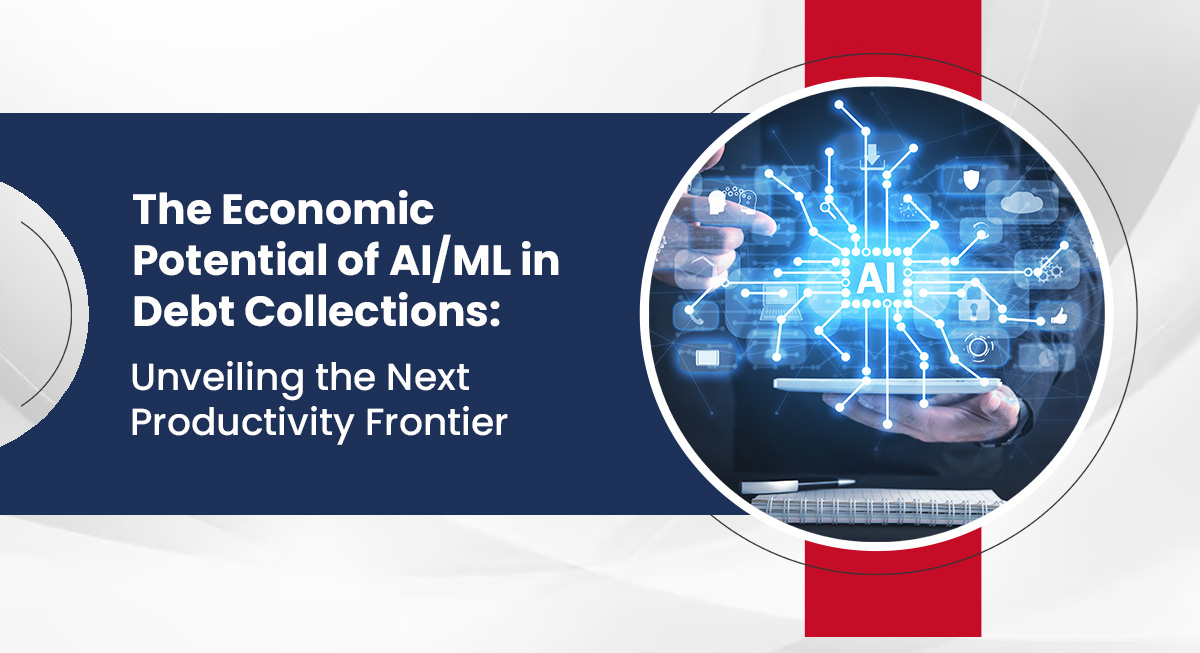Introduction
In recent years, the financial landscape has been rapidly evolving, and technology is at the forefront of this evolution. The integration of Artificial Intelligence (AI) and Machine Learning (ML) technologies has emerged as a promising frontier. These innovations have the potential to significantly impact debt collections, making operations more efficient, cost-effective, and customer-centric. In this blog, we’ll delve into the economic promise that AI/ML holds in debt collections, envisioning a future where these technologies unlock non-linear productivity.
1. Crunching the Data Deluge
- Fact 1: AI/ML can process and analyse vast amounts of data with unparalleled speed and accuracy. Debt collection agencies can leverage this to analyse customer behaviour, payment patterns, and financial trends.
- Fact 2: According to a study by McKinsey, the integration of AI and analytics in debt collection operations led to a 15% reduction in collection costs.
2. Crystal Ball of Debt Collections: Predictive Modelling
- Fact 3: Predictive modelling, powered by AI/ML, can predict payment likelihoods with an accuracy of up to 95% based on historical data and customer behaviour patterns.
- Fact 4: A case study by FICO demonstrated that predictive modelling helped a debt collection agency increase recoveries by 15% and reduce overall collection costs by 10%.
3. Tailored Approaches for Every Persona
- Fact 5: AI-powered segmentation can categorise customers into distinct personas, enabling tailored communication and engagement strategies.
- Fact 6: In a case study by Salesforce, a debt collection agency increased its collection rate by 12% through personalised communication strategies based on customer personas.
4. Streamlining Operations: Automation and Efficiency
- Fact 7: Automation of routine tasks in debt collection processes can reduce operational costs by up to 60%, according to a study by PricewaterhouseCoopers.
- Fact 8: A case study by Exus showcased a 30% reduction in idle time for debt collectors through the implementation of AI-driven automation.
5. Navigating the Legal Maze: Regulatory Compliance
- Fact 9: AI/ML algorithms can ensure compliance by rapidly adapting to changing legal and regulatory requirements, reducing the risk of non-compliance penalties.
- Fact 10: A study by KPMG highlighted that AI-powered compliance systems reduced compliance costs by 25% for debt collection agencies.
6. Detecting Red Flags: Fraud Detection and Risk Mitigation
- Fact 11: AI-based fraud detection systems can detect fraudulent activities in real time, reducing financial losses and protecting both customers and businesses.
- Fact 12: A case study by Featurespace demonstrated a 50% reduction in fraud-related losses for a debt collection agency through AI-powered fraud detection.
7. A Human Touch, Amplified: Improved Customer Experience
- Fact 13: AI-powered chatbots can handle up to 80% of routine customer interactions, providing instant responses and enhancing overall customer experience.
- Fact 14: A study by Juniper Research found that AI-powered chatbots resulted in a 98% customer satisfaction rate for debt collection inquiries.
Conclusion
The integration of AI and ML into debt collections is not just a vision of the future—it’s a reality reshaping the industry. The economic potential of these technologies is immense, promising increased efficiency, cost-effectiveness, and improved customer relations. In this age of rapid technological advancement, embracing AI/ML in debt collections is an investment worth making to achieve sustainable growth and competitiveness in the financial sector.

